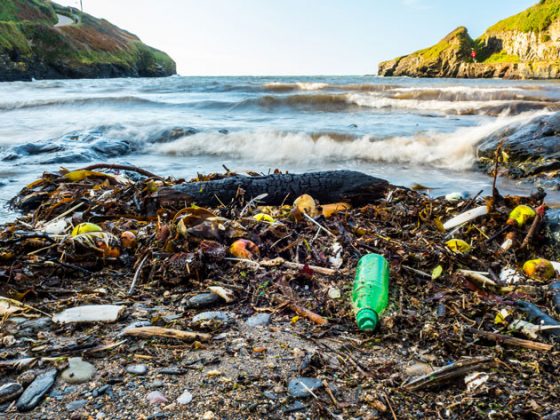Decreasing their environmental impact seems to have been a New Year’s resolution for many companies and governments in 2018. This month, several major organizations announced ambitious recycling campaigns in an effort to appease consumers, reduce costs and limit environmental harm.
Dow Chemicals
A collaboration between the U.S. Green Building Council and Dow Building Solutions aims to reduce carbon emissions by advising two cities or communities to help in achieving Leadership in Energy and Environmental Design (LEED) certification. The Dow Chemical subsidiary announced these plans last week as a reaction to data that buildings are currently responsible for about one-third of global energy consumption, about 30% of global energy-related CO2 emissions and 20% of total CO2 emissions.
“This partnership will offer expertise from Dow and USGBC that will not only directly help selected communities reduce their carbon footprint, but will also pave the way for other communities to do the same,” Greg Bergtold, director of advocacy for Dow Building Solutions said in a statement.
In October 2017, Dow announced a strategic partnership to produce recycled plastic bags that are being used to collect trash on ocean shores. Using post-industrial plastic scraps, Dow’s RETAIN recycling technology enabled the production of the recycled bags used for the cleanup.

McDonald’s
This week, McDonald’s pledged that by 2025 all of its guest packaging will originate “from renewable, recycled, or certified sources with a preference for Forest Stewardship Council certification.” The fast food giant will also strive to recycle guest packaging in all of its locations in that same year.
This expands upon McDonald’s existing goal that by 2020, 100% of its fiber-based packaging will come from recycled or certified sources where no deforestation occurs.
“Our customers have told us that packaging waste is the top environmental issue they would like us to address,” Francesca DeBiase, McDonald’s chief supply chain and sustainability officer said in a statement. “Our ambition is to make changes our customers want and to use less packaging, sourced responsibly and designed to be taken care of after use, working at and beyond our restaurants to increase recycling and help create cleaner communities.”
Coca-Cola
To combat what Coca-Cola’s CEO James Quincey referred to as the “world’s packaging problem,” the company announced a sustainability plan called World Without Waste. The strategy will focus on the entire packaging lifecycle—from the creation of bottles and cans through their use and how they’re recycled and repurposed.
Part of its initiative is a plan to recycle a bottle or can for each one sold. By 2030, the company will collect or recycle the equivalent of its entire packaging output; and it is aiming to make bottles half-composed of recycled content. Quincey acknowledged the timing of his company’s and McDonald’s announcements as a coincidence, but that they would collaborate since its drinks are sold at McDonald’s restaurants.
Greenpeace, a vocal critic of Coca-Cola, said the company should focus on reducing the amount of plastic it produces, rather than just recycling more. “We can’t recycle our way out of this mess,” said Greenpeace campaigner Louise Edge, in a statement.
The United Kingdom
Similar initiatives are also appearing overseas in the form of legislation. In the United Kingdom, where there is a levy against plastic bags, members of Parliament announced plans to potentially fund infrastructure and cut down on 30,000 tons of waste by imposing a tax on each coffee cup sold by a retailer. The Guardian reported that 2.5 billion to-go coffee cups are disposed of annually in the U.K., not counting the coffee grips, stirrers and other amenities often associated with a standard coffee drink. The short-term solution is for retailers to sell reusable cups and for consumers to repeatedly bring them when out for a cup of joe.
An audit report indicated that one in 400 cups are recycled – less than 0.25%—and half a million coffee cups are littered each day in the U.K. Members of Parliament are calling for:
- A 25p levy (35 cents, USD) on coffee bought in takeaway cups to be used to reduce the number of cups thrown away and invest in reprocessing facilities
- Introduction of a ban on throwaway coffee cups if a target that all takeaway cups are recyclable by 2023 is not met
- Coffee chains to pay more towards disposing of cups
- Improved labeling to better educate consumers
